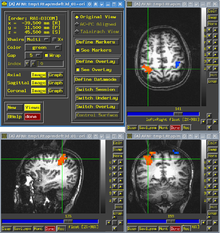- Cognitive rehabilitation therapy
-
Cognitive rehabilitation therapy is a program to help brain-injured or otherwise cognitively impaired individuals to restore normal functioning, or to compensate for cognitive deficits.[1] It entails an individualized program of specific skills training and practice plus metacognitive strategies. Metacognitive strategies include helping the patient increase self-awareness regarding problem-solving skills by learning how to monitor the effectiveness of these skills and self-correct when necessary.
Cognitive rehabilitation therapy has been shown to be effective for individuals who suffered a stroke in the left or right hemisphere.[2] A computer-assisted type of cognitive rehabilitation therapy called Cognitive Remediation Therapy has been used to treat schizophrenia, ADHD, and Major depressive disorder.[3][4][5][6][7]
It may also be recommended for traumatic brain injury, such as that suffered by U.S. Representative Gabrielle Giffords, according to Dr. Gregory J. O'Shanick of the Brain Injury Association of America.[8] Her new doctor has confirmed that it will be part of her rehabilitation.[9]
Assessments of cognitive rehabilitation therapy
According to the standard text by Sohlberg and Mateer:[10]
Individuals and families respond differently to different interventions, in different ways, at different times after injury. Premorbid functioning, personality, social support, and environmental demands are but a few of the factors that can profoundly influence outcome. In this variable response to treatment, cognitive rehabilitation is no different from treatment for cancer, diabetes, heart disease, Parkinson's disease, spinal cord injury, psychiatric disorders, or any other injury or disease process for which variable response to different treatments is the norm.
Nevertheless, many different statistical analyses of the benefits of this therapy have been carried out. One study made in 2002 analyzed 47 treatment comparisons and reported "a differential benefit in favor of cognitive rehabilitation in 37 of 47 (78.7%) comparisons, with no comparison demonstrating a benefit in favor of the alternative treatment condition."[2]
An internal study conducted by the Tricare Management Agency in 2009 is cited by the US Department of Defense as its reason for refusing to pay for this therapy for veterans who have suffered traumatic brain injury. According to Tricare, "There is insufficient, evidence-based research available to conclude that cognitive rehabilitation therapy is beneficial in treating traumatic brain injury."[11] The ECRI Institute, whose report serves as the basis for this decision by the Department of Defense, has summed up their own findings this way:[1]
In our report, we carried out several meta-analyses using data from 18 randomized controlled trials. Based on data from these studies, we were able to conclude the following:
- Adults with moderate to severe traumatic brain injury who receive social skills training perform significantly better on measures of social communication than patients who receive no treatment.
- Adults with traumatic brain injury who receive comprehensive cognitive rehabilitation therapy report significant improvement on measures of quality of life compared to patients who receive a less intense form of therapy.
Citing this 2009 assessment, US Department of Defense has declared that cognitive rehabilitation therapy is scientifically unproved. As a result, it refuses to cover the cost of cognitive rehabilition for brain-injured veterans.[11][12]
See also
References
- ^ a b "Cognitive Rehabilitation Therapy for Traumatic Brain Injury: What We Know and Don’t Know about Its Efficacy". ECRI Institute. 2011-01-21. https://www.ecri.org/Documents/TA/Cognitive_Rehabilitation_Therapy_ECRI_Institute_012111.pdf. Retrieved 2011-01-23. "Approaches to cognitive rehabilitation therapy are generally separated into two broad categories: restorative and compensatory."
- ^ a b Keith D. Cicerone; Cynthia Dahlberg, James F. Malec, Donna M. Langenbahn, Thomas Felicetti, Sally Kneipp, Wendy Ellmo, Kathleen Kalmar, Joseph T. Giacino, J. Preston Harley, Linda Laatsch, Philip A. Morse, Jeanne Catanese (August 2002). "Evidence-Based Cognitive Rehabilitation: Updated Review of the Literature From 1998 Through 2002". Archives of Physical Medicine and Rehabilitation (xxx: Elsevier) 86 (8): 1681–1692. doi:10.1016/j.apmr.2005.03.024. PMID 16084827. http://www.archives-pmr.org/article/S0003-9993(05)00330-8/abstract. Retrieved 2011-01-22. "The overall analysis of 47 treatment comparisons, based on class I studies included in the current and previous review, reveals a differential benefit in favor of cognitive rehabilitation in 37 of 47 (78.7%) comparisons, with no comparison demonstrating a benefit in favor of the alternative treatment condition."
- ^ Elgamal S, McKinnon MC, Ramakrishnan K, Joffe RT, MacQueen G.Successful computer-assisted cognitive remediation therapy in patients with unipolar depression: a proof of principle study. Psychol Med. 2007 Sep;37(9):1229-38. Epub 5 July 2007. PMID 17610766
- ^ Wykes T. Cognitive remediation therapy in schizophrenia: randomised controlled trial. Br J Psychiatry. 2007 May;190:421-7.PMID 17470957
- ^ Wykes T. Cognitive remediation therapy (CRT) for young early onset patients with schizophrenia: an exploratory randomized controlled trial.Schizophr Res. 2007 Aug;94(1-3):221-30. Epub 2007 May 2PMID 17524620
- ^ O'Connell RG, Bellgrove MA, Dockree PM, Robertson IH. Cognitive remediation in ADHD: effects of periodic non-contingent alerts on sustained attention to response. Neuropsychol Rehabil. 2006 Dec;16(6):653-65.PMID 17127571
- ^ Stevenson CS. et al.A cognitive remediation programme for adults with Attention Deficit Hyperactivity Disorder.Aust N Z J Psychiatry. 2002 Oct;36(5):610-6.PMID 12225443
- ^ Thomas M. Burton (2011-01-10). "Brain at Risk Despite Quick Aid". Wall Street Journal. http://online.wsj.com/article/SB10001424052748703667904576072190494009886.html?mod=googlenews_wsj. Retrieved 2011-01-21. ""The rapid treatment she received needs to be matched by a seamless course of rehabilitation such as cognitive rehabilitation," Dr. O'Shanick said."
- ^ "'Intensive Rehabilitation' Is Next for Giffords, New Doctor Says". ABC News Radio. 2011-01-21. http://abcnewsradioonline.com/national-news/tag/john-holcomb. Retrieved 2011-01-29. "The key is get into intensive rehabilitation...Bringing in lots of different people from different specialties to work as a coordinated team, speech, cognitive, physical rehabilitation."
- ^ McKay Moore Sohlberg; Catherine A Mateer (2001). Cognitive rehabilitation: an integrative neuropsychological approach. Guilford Press. p. 4. ISBN 1572306130. http://books.google.com/books?id=ddeYbfy5Ue8C&dq.
- ^ a b Andrew Tilghman (2011-01-01). "Military insurer denies coverage of new brain injury treatment". USA Today. http://www.usatoday.com/news/military/2011-01-01-brain-injury-insurer_N.htm. Retrieved 2011-01-21. "In an internal 2009 study, the Tricare Management Agency found that cognitive rehabilitation therapy is scientifically unproved and does not warrant coverage as a stand-alone treatment for brain injuries."
- ^ Letter to The Honorable Robert Gates from Senator Claire McCaskill (January 19, 2011)
Categories:- Neurotrauma
- Neuropsychology
- Occupational therapy
- Rehabilitation medicine
Wikimedia Foundation. 2010.

